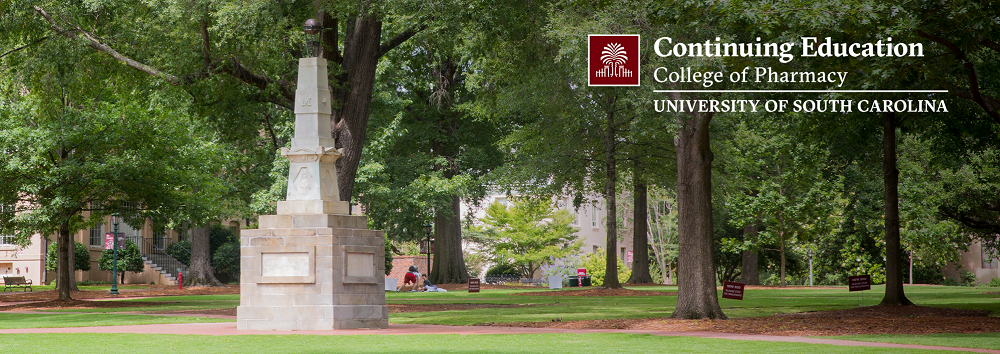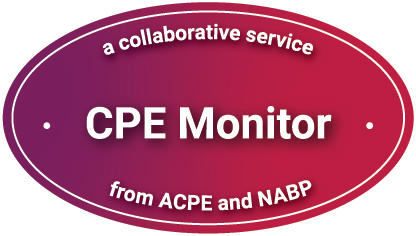- Operating System: Windows, Mac OS and Linux
- Internet Browser: Internet Explorer 7.0 or higher; Mozilla Firefox 3.0 or higher; Google Chrome
- Computer Speakers or headphones connected to your computer
- Broadband Internet Connection: Cable, High-speed DSL or T1
- Monitor Screen Resolution: 320x480 or higher
- Media Viewing Requirements: Adobe Reader, Microsoft Power Point and HTML
- Identify educational techniques to improve continuous glucose monitor (CGM) comprehension for medical residents
- Identify appropriate unfractionated heparin continuous infusion dosing for common indications
- Describe the current development and future goals of an ambulatory care pharmacy internship program in a large health-system
- Discuss the clinical utility of diagnostic tools used in community acquired pneumonia, specifically the Legionella Urinary Antigen
- Compare projected costs of an institutional algorithm that includes vancomycin alternatives to a historical strategy of initial vancomycin therapy for treatment of methicillin-resistant Staphylococcus aureus (MRSA) bloodstream infections (BSI)
- Identify an appropriate route and dose for magnesium replacement in heart failure patients concurrently receiving intravenous (IV) loop diuretics
- Describe the rationale for propranolol use in traumatic brain injury
- Describe the epidemiology and treatment outcomes of Bartonella spp. disseminated disease
- Enhance the description of valproic acid therapeutic drug monitoring by validating risk factors leading to discordant levels
- Recommend appropriate empiric antimicrobials for a NICU patient presenting with late onset sepsis
- Determine which concentration of heparin has the highest purge reliability when used in the Impella purge solution
- Evaluate the prevalence of Gram-negative bacilli (GNB) with difficult-to-treat resistance (DTR)
- Determine the use of new β-lactams by antibiotic use (AU) and adjusted antibiotic use (a-AU) metrics
- Define complication as it relates to Gram-negative bloodstream infection (BSI) and the clinical impact of these complications
- Describe the benefit of the opioid stewardship program on overall patient opioid use and prescribing practices by physicians in a family medicine teaching center
Fee
CE Hours
CE Units
Activity Type
- Application
Target Audience(s)
- Pharmacists
Accreditation(s)

|
The University of South Carolina College of Pharmacy is accredited by the Accreditation Council for Pharmacy Education as a provider of continuing pharmacy education.
|
Co-Sponsor(s)
Requirements for CE Credit
- Read the learning objectives and faculty disclosures
- Review the video presentation and engage in any suggested interactivity
- Complete the program evaluation form.
|
Please choose a Fee Type from the Drop Down Menu Below:
I am a
|
- Identify educational techniques to improve continuous glucose monitor (CGM) comprehension for medical residents
- Identify appropriate unfractionated heparin continuous infusion dosing for common indications
- Describe the current development and future goals of an ambulatory care pharmacy internship program in a large health-system
- Discuss the clinical utility of diagnostic tools used in community acquired pneumonia, specifically the Legionella Urinary Antigen
- Compare projected costs of an institutional algorithm that includes vancomycin alternatives to a historical strategy of initial vancomycin therapy for treatment of methicillin-resistant Staphylococcus aureus (MRSA) bloodstream infections (BSI)
- Identify an appropriate route and dose for magnesium replacement in heart failure patients concurrently receiving intravenous (IV) loop diuretics
- Describe the rationale for propranolol use in traumatic brain injury
Speaker(s)/Author(s)
|
Abigail Bouknight, PharmD
|
|
|
Cassidy H. Kemp, PharmD
|
|
|
Emma Haught, PharmD
|
|
|
Lawrence Bean, PharmD
|
|
|
Logan Boone, PharmD
|
|
|
Rachel LeClair, PharmD
|
|
|
Taylor Gregory, PharmD
|
Activity Number
0062-9999-22-139-H01-P
CE Hours
Location
- Describe the epidemiology and treatment outcomes of Bartonella spp. disseminated disease
- Enhance the description of valproic acid therapeutic drug monitoring by validating risk factors leading to discordant levels
- Recommend appropriate empiric antimicrobials for a NICU patient presenting with late onset sepsis
- Determine which concentration of heparin has the highest purge reliability when used in the Impella purge solution
- Evaluate the prevalence of Gram-negative bacilli (GNB) with difficult-to-treat resistance (DTR)
- Determine the use of new beta-lactams by antibiotic use (AU) and adjusted antibiotic use (a-AU) metrics
- Define complication as it relates to Gram-negative bloodstream infection (BSI) and the clinical impact of these complications
- Describe the benefit of the opioid stewardship program on overall patient opioid use and prescribing practices by physicians in a family medicine teaching center
Speaker(s)/Author(s)
|
Aly York, PharmD
|
|
|
Benjamin Tabor, PharmD
|
|
|
Erin Warren, PharmD
|
|
|
Gadison Quick, PharmD
|
|
|
Morgan Pizzuti, PharmD
|
|
|
Taylor Teshon, PharmD
|
|
|
Y. Vivian Tsai, PharmD
|
Activity Number
0062-9999-22-140-H01-P

